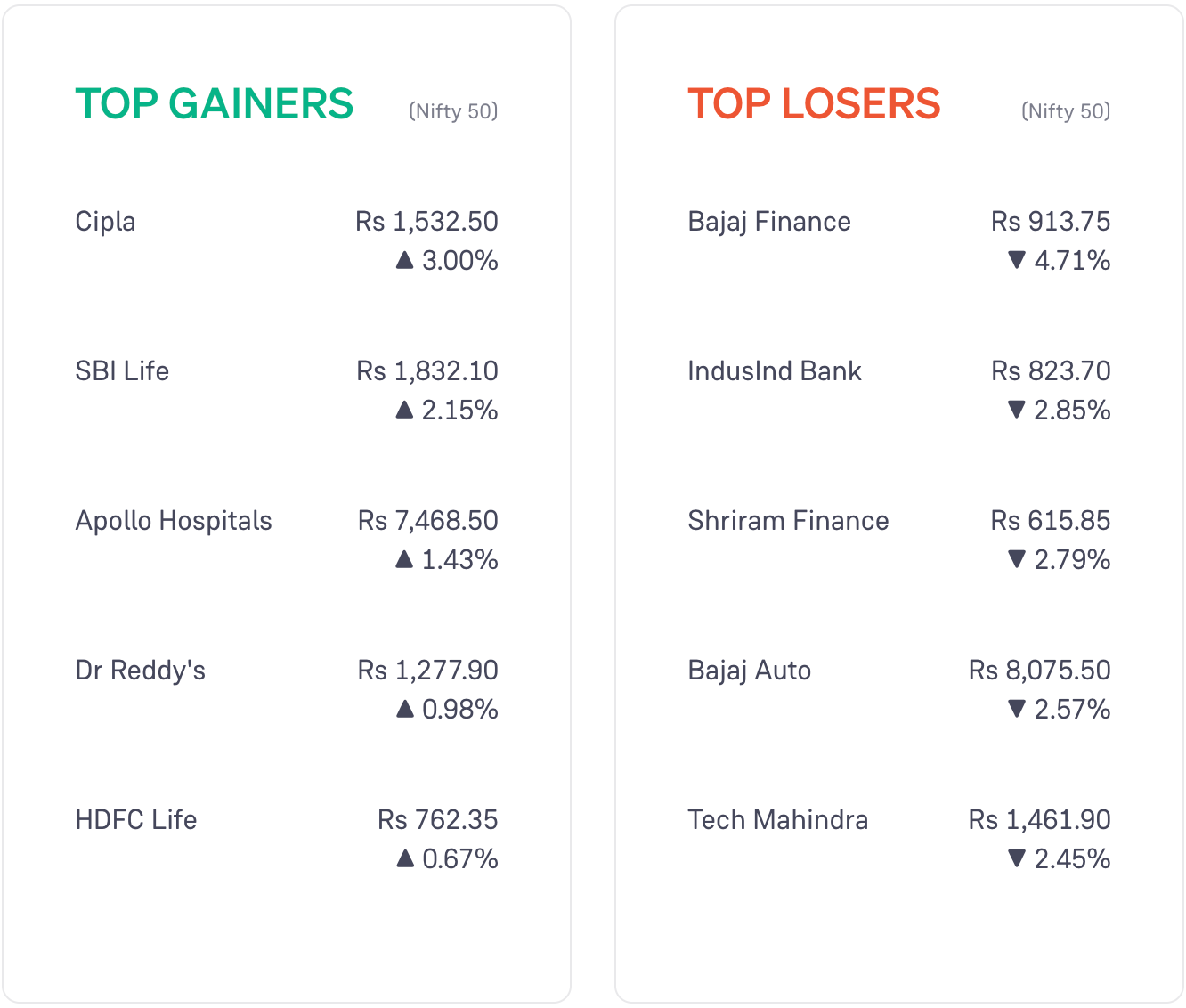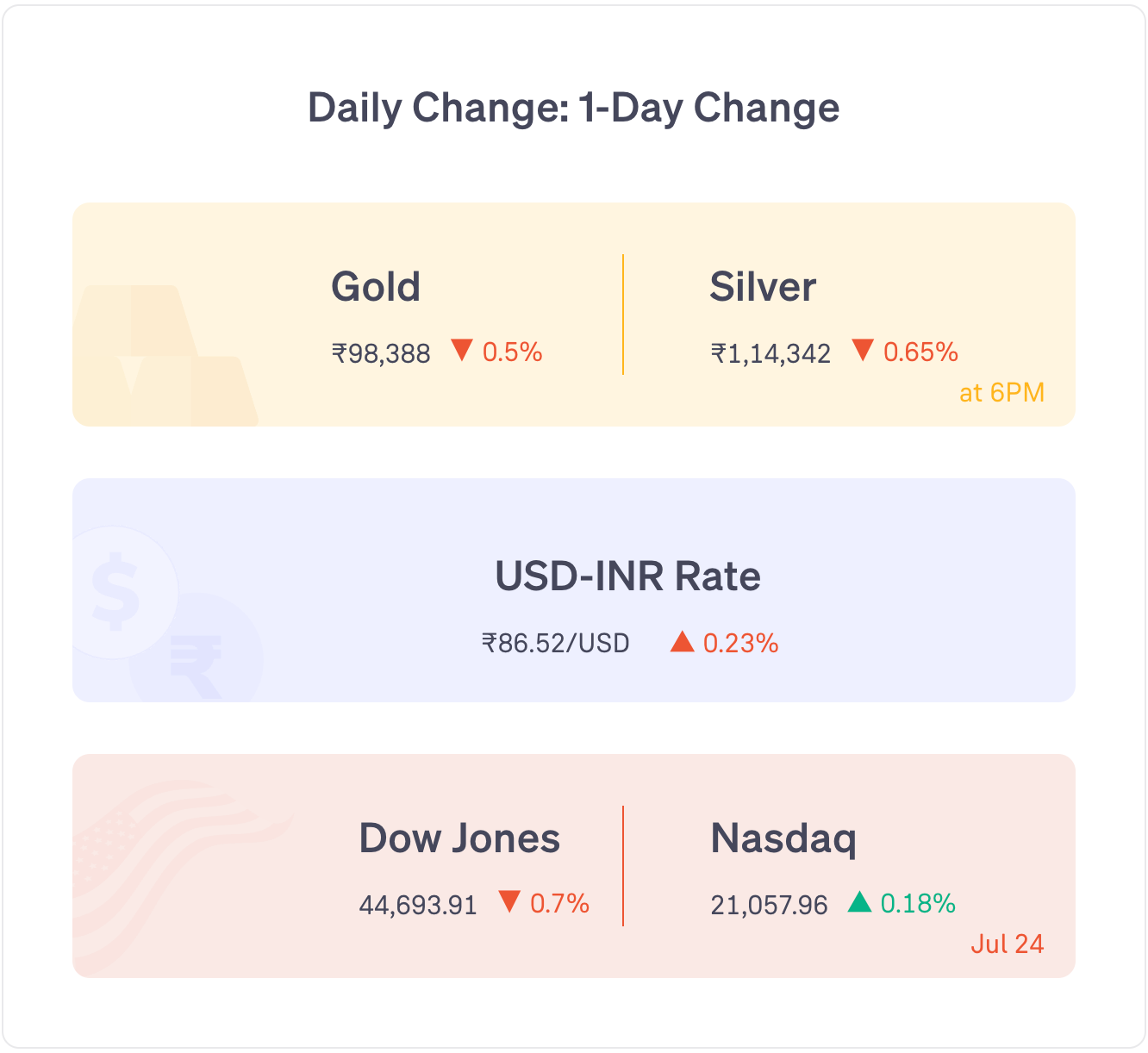PhysicsWallah's Rs 4,600 crore IPO, Bajaj Finserv profits up 30%, & more — Daily Digest
Friday, 25 July 2025
Markets opened below yesterday’s closing point.
Nifty 50 fell due to a fall in large financial stocks and uncertainty in the India-US trade deal. On top of that, global markets fell which affected the Indian markets.
Healthcare stocks and pharma stocks rose the most today. Media stocks and oil and gas stocks fell the most.
Global markets: US markets were flat. Most European and Asian markets closed in red.
News
India’s foreign exchange reserves fell by $1.18 billion to $695.49 billion in the week that ended on 18 July.
India’s domestic air traffic rose to 1.36 crore in June (vs 1.32 crore in May): DGCA
PhysicsWallah got SEBI’s approval for a Rs 4,600 crore IPO.
Brigade Hotel IPO has been subscribed 1.19 times. Retail Subscription: 4.65 times. IPO closes on 28 July.
Indiqube Spaces IPO was subscribed 12.33 times. Retail Subscription: 12.55 times. IPO closed for subscription today.
GNG Electronics IPO was subscribed 146.90 times. Retail Subscription: 45.32 times. IPO closed for subscription today.
Stocks Updates
Bajaj Finserv: net profit rose 30% year-on-year to Rs 2,789 crore in the April-June quarter.
Bank of Baroda: net profit fell 27% year-on-year to Rs 3,469 crore in the April-June quarter. Net NPAs fell to 0.60% (vs 0.69% in the previous year).
Cipla: net profit rose 10% year-on-year to Rs 1,298 crore in the April-June quarter.
Shriram Finance: net profit rose 6% year-on-year to Rs 2,159 crore in the April-June quarter. Interest income rose 19% to Rs 11,174 crore. The board will meet between 1 Aug to 31 Oct to consider raising funds through debt instruments.
SBI Cards: net profit fell 6% year-on-year to Rs 556 crore in the April-June quarter. Dividend announced: Rs 4.60 per share, with record date: 1 August.
GAIL: received Petroleum and Natural Gas Regulatory Board approval to double the capacity of its Jamnagar-Loni LPG pipeline from 3.25 MMTPA to 6.5 MMTPA. It also filed a Rs 639 crore arbitration claim against 3 entities related to gas supply shortfalls.
JSW Energy: company subsidiary, JSW Neo Energy, signed a 25-year Power Purchase Agreement (PPA) with SECI for 230 MW of renewable energy. The company signed another PPA with Bangalore Electricity Supply Company (BESCOM) for a 100 MW solar project with battery storage. It also confirmed the withdrawal of the insolvency process for KSK Water Infrastructures Pvt Ltd.
Bharat Electronics: received a Rs 1,640 crore order from the Indian Army to manufacture Air Defence Fire Control Radars (Atulya), designed by DRDO.
Word of the Day
Trade Barriers
They are government imposed rules or policies that limit trade between countries
A country can impose trade barriers on another country to protect its domestic industries or for geopolitical reasons.
These barriers can be of many types – tariffs, quotas, bans, or regulations and standards.
Example: USA’s 15% tariffs on Japan, EU’s temporary ban on Indian mangoes after failing to meet the quality standards.
Trade barriers are often used to protect national interests, but they can also lead to higher prices for consumers in the home country.
6 Day Course
Theme: allocating monthly income
Day 5: Friday
Now we come to the last day — after all the expenses spoken about earlier, we are left with leisure spending.
Whatever amount is left — could be 10%, could be 30%, or higher — that can be spent in any manner.
Travel, lifestyle, luxuries, etc. Unsurprisingly, this is the last category of spending.
Do note that everybody’s spending is unique. This means that not everybody can fit in the percentages we have discussed so far.
If you have a person in the house who requires high medical expenses, then every allocation changes.
If you have many pre-existing loans that must be cleared, then you will have to spend accordingly.
Those are negative cases. This still holds true even for positive cases.
If a person is very passionate about travelling, then that expense will feature much higher in their priority.
It is best to look at the allocations discussed in this series so far, and modify it to suit yourself.
Featured Question
Q. “Why r some shares locked in upper circuit. What r the benefits & whom it is benifial. Thank u.”
When a share rises too fast, trading is stopped for some time. After that time, if it continues to rise above a certain limit, trading is stopped for the rest of the day.
This is done to prevent a stock from reacting too fast to rumours and incomplete information.
The percentage is different for different stocks.
Similarly, a lower circuit is applied to falling stocks.
When a company’s share is locked in upper circuit, it means that the demand for that stock is very high while there are few sellers.
This is what causes the share price to shoot up.
The price rise can indicate some big positive news — like a jump in revenue, profits, merger, approval, etc.
It can also indicate someone trying to manipulate the share price.
Obviously, a share hitting upper circuit is not good if you are planning to buy the shares — they are getting more expensive.
But if you are already a shareholder, this is good news since the value of your shares is going up.
Did you like this edition?
Leave a feedback here!






